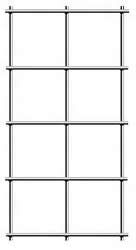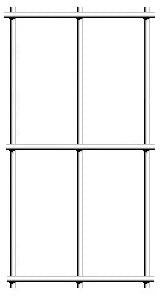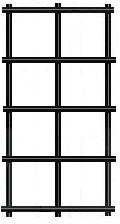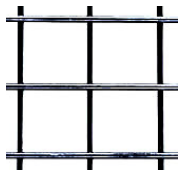The Difference Between Welded and Woven Wire Mesh
Posted by Ayokunle Ademola-John on
Wire mesh is an essential component in a variety of applications, from fencing and enclosures to construction and industrial uses. Choosing the right type—welded wire mesh or woven wire mesh—depends on your specific needs, as each has distinct advantages and properties. In this post, we’ll explore the key differences between these two mesh types and their best use cases.
1. Manufacturing Process
Welded Wire Mesh:
- Created by spot-welding intersecting wires at their junctions, forming a grid.
- Typically produced in a rectangular or square pattern.
- Ensures rigid structure and uniform spacing.
Woven Wire Mesh:
- Made by interlacing wires, similar to weaving fabric, to create a flexible grid.
- Various weaving patterns are available, such as plain weave, twill weave, or Dutch weave.
- The interwoven design allows for more flexibility and resilience under pressure.
2. Structural Properties
Welded Wire Mesh:
- Rigid and Sturdy: Maintains shape under tension and pressure, ideal for permanent installations.
- Resistant to Unraveling: If one section is cut, the rest of the mesh remains intact.
- Limited Flexibility: Cannot conform to irregular surfaces easily.
Woven Wire Mesh:
- Flexible and Adaptive: Easily conforms to uneven terrain or curved surfaces.
- Susceptible to Unraveling: If damaged, the mesh can fray or lose integrity over time.
- Elastic Strength: Absorbs impact well, making it ideal for containing animals or wildlife.
3. Material Options
Both types of wire mesh are available in a range of materials:
- Welded Wire Mesh: Commonly made with galvanized steel, stainless steel, or vinyl-coated steel.
- Woven Wire Mesh: Typically manufactured with galvanized steel, stainless steel, or softer materials for added flexibility.
4. Applications
Welded Wire Mesh:
- Fencing: Excellent for security, garden fencing, and property enclosures.
- Industrial Uses: Ideal for machine guards, construction reinforcements, and partitions.
- Animal Enclosures: Strong enough to contain livestock or pets.
Woven Wire Mesh:
- Agricultural Uses: Preferred for flexible fences on farms, such as field or deer fencing.
- Erosion Control: Perfect for areas with uneven surfaces or slopes.
- Wildlife Management: Used to create adaptable barriers for wildlife containment.
5. Durability and Longevity
Welded Wire Mesh:
- Higher Durability: Welded intersections are less prone to wear and tear.
- Ideal for Harsh Conditions: Withstands constant pressure and exposure to elements.
- Low Maintenance: Once installed, requires little upkeep.
Woven Wire Mesh:
- Better for Temporary Use: Its flexibility makes it easier to install and remove.
- Can Fray Over Time: Requires careful handling to prevent damage.
- Maintenance Needed: May need tightening or replacement if unraveled.
6. Cost Considerations
- Welded Wire Mesh: Slightly more expensive due to its production process and higher durability. However, its longevity often offsets the initial cost.
- Woven Wire Mesh: More cost-effective upfront, particularly for temporary or lightweight applications.
7. Aesthetic Considerations
Welded Wire Mesh:
- Offers a clean, uniform appearance.
- Ideal for decorative uses in landscaping or architectural projects.
Woven Wire Mesh:
- Provides a natural, rustic look.
- Blends well with agricultural and rural environments.
8. Choosing the Right Mesh for Your Project
Choose Welded Wire Mesh if you need:
- Strong, rigid fencing for security or property boundaries.
- Long-lasting enclosures for pets, livestock, or industrial use.
- Durable reinforcement for concrete or construction projects.
Choose Woven Wire Mesh if you need:
- Flexible fencing for uneven terrain or slopes.
- Lightweight barriers for wildlife management or agricultural use.
- Temporary fencing or enclosures that are easy to install and remove.
Explore Premium Wire Mesh Options
At Louis Page, we offer both welded wire mesh and woven wire mesh in a variety of materials, sizes, and finishes to meet your needs. Whether you’re securing your property or managing a farm, we have the perfect solution.
📞 Call us at 978-486-3116 or visit Shop Welded Wire Fence to explore our high-quality products today!
Conclusion
Understanding the differences between welded and woven wire mesh helps you choose the best option for your project. By evaluating factors like strength, flexibility, and intended use, you can ensure a successful installation that meets your goals. For expert advice and premium materials, trust Louis Page—your fencing solution since 1893.
Share this post
- Tags: american made, deer fence, wire fence, wire mesh





